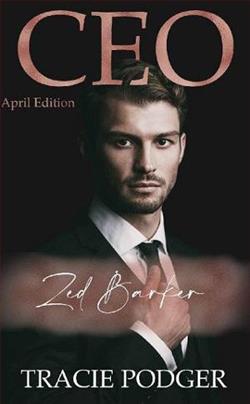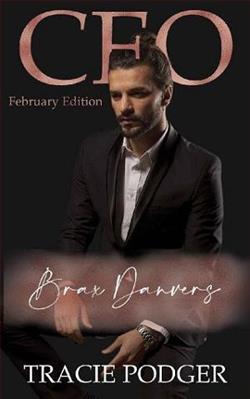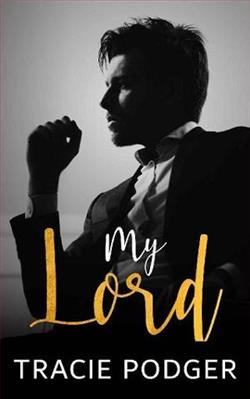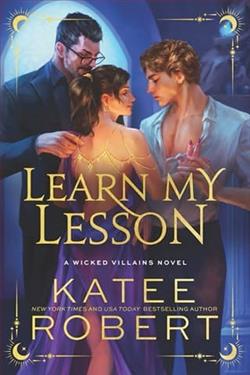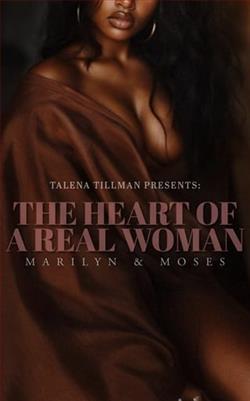Page 137 of Night's Reckoning
“He was a magician,” Tenzin continued. “Fire, glass, and metal were his obsession. He lived in the mountains alone, and he had no mate, no sire, no family at all. Only a few human apprentices and a woman from the nearest village who cooked and cleaned for him.”
Cheng asked, “What happened to him? Something happened, because he is no longer living. Everyone knows Harun is dead. Unless it is a myth like Arosh’s death.”
“No, I am quite certain he is dead.” Tenzin remembered the long night with the old man in a caravanserai near Samarkand. She remembered fire and tea and dates stuffed with walnuts. The human who told her the tale was an old Sogdian trader. He had a dagger and Tenzin wanted it. “I wanted to buy a piece in a man’s possession—a double-edged dagger with a jade hilt—but the gold I offered was insufficient to convince him to sell.”
“How much gold?”
“You don’t want to know. The money meant nothing. I wanted one of Harun’s blades. The old man forced me to pay him with an exchange of stories. Well, the gold and the stories. I would tell one of mine and then listen to one of his. And the story he told me was the tale of Harun al Ilah.”
“And you believed him?”
Tenzin said, “There are stories to tell a history and those to tell a story. This was a history, and I believe every word.”
Cheng brushed a hand over her hair. “So what happened to Harun al Ilah?”
“The old woman who cleaned and cooked for him died after many years, but as was the tradition of her family, her granddaughter came and learned Harun’s secrets so she could carry on keeping house for the immortal.
“The granddaughter came and learned all her grandmother taught her. Learned how to cook Harun’s favorite meals and tend the fires in the house to please him. How to make his tea and keep the home cool. She knew that, like Harun’s apprentices, she would have to offer her blood once every month, but she would be rewarded for her devotion and secrecy.
“So the woman came to work for Harun, giving up her plans to marry a boy from her village and hoping only that, like her grandmother, one of Harun’s apprentices might consider her a good wife. Her name was Layah. She was plain-faced but had hair so beautiful she wore it covered so no one could see and remark on it, because she was a quiet woman who didn’t care for attention.”
“The perfect housekeeper for a vampire,” Cheng said.
“Harun took no notice of Layah at first. She was only another human. Another servant. She cooked his meals the same way her grandmother did and kept the house clean. She was so quiet some of his apprentices would joke that she couldn’t speak at all.
“But she could speak, and in fact, she could sing. She sang as she worked, and while Harun slept he could hear her. He was an ancient vampire and did not sleep deeply. He heard her sweet songs in his dreams, and he asked her to sing them when he woke. When he was in a bitter mood or frustrated with a difficult job, he asked her to sing to soothe his temper.”
“And she did?”
“Always.” Tenzin shifted her gaze to the dark windows outside Cheng’s cabin. “One night Harun realized that he didn’t hear Layah when he woke. He went to her room and saw that she had a fever. She burned so hot Harun feared she would die. He called a human healer from the village and the healer came, but Harun would not leave her. The healer took the veil from her beautiful hair, and Harun was transfixed by its beauty, for her hair was a blend of gold and silver and unlike anything he’d seen in his many years.”
“Did he love her?” Cheng asked. “It is one thing to be fixed on a beautiful object, but another to truly love.”
“Faced with the prospect of losing the human who had given him peace for the first time in his immortal life, Harun realized he did love the woman. Her beauty was revealed by far more than her hair.”
Cheng ruffled Tenzin’s hair. “But beautiful hair always helps.”
Tenzin felt a smile growing. “Layah grew healthy again, and Harun began to give her gifts. He moved her to a richly appointed room in his house, gave her jewelry and fine clothes, and hired another girl to help her tend his house. Eventually Layah told him that she would need to return to her village and her mother’s house because she was no longer his servant. All her work was taken up by another, and all she did was sing and make his tea. Harun demanded that she stay—”
“Demands are a sure way to convince a human woman you love her,” Cheng said. “Or so I’ve been told.”
“—but he asked her to be his wife and not his servant.” Tenzin turned to Cheng. “Asked. Not demanded.”
Cheng’s smiled was sad. “But would he have truly let her go?”
“I don’t know.” Tenzin turned back to the treasure. “She stayed. He created the most beautiful jewelry after he and Layah married. Her hair inspired him to blend gold and silver in many of his pieces.” She pointed. “Like that headband. They were together for many years, and she bore him seven children.”
“Vampires can’t father children.”
Tenzin shrugged. “Harun did many impossible things. Why couldn’t he have fathered children too?”
“Did she turn?”
Tenzin’s heart hurt. “No. She never did. And he never left her. Layah grew old and died, surrounded by their children and grandchildren. Harun buried his wife and finished all the swords he had promised to make. Then he walked into the light to join her.”
Cheng took a deep breath and slipped his arm around Tenzin’s shoulders. “You were never going to be Harun, Cricket.”
“No.” She stared at the gold-and-silver headband fashioned for a queen who would never die. “I am not so generous.”








